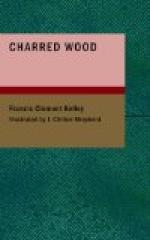“Did you know some people named Meechamp?”
“I knew a family of that name in London. They were parishioners of mine during my short pastorate there, before I became a Catholic.”
“Then you did meet me before. I was present at your farewell sermon. I was visiting the Meechamps at the time. That sermon made a lifelong impression on me. After hearing it I was worried about my own state of mind, for I had given up the practice of the very religion you were sacrificing your prospects to embrace. I went in to your study to see you that morning.”
“Ah, now I remember,” exclaimed the priest. “So it was you who came to see me?”
“Yes; and I have never forgotten your last words to me: ’Remember this: the door we are passing through this morning, going in opposite directions, is never locked.’ But let that pass. I want to come quickly to something else. That morning a little girl sat all alone in a pew near your study door. She spoke to me as I came out: ’Is he crying?’ she asked. I answered, ‘I’m afraid, my dear, that he is.’ She bristled at once: ‘Did you make him cry?’ I had to smile at her tone of proprietorship in you. ‘No, my dear,’ I said, ’I never make good people cry.’ That made us friends. ‘Do you love him?’ I asked. ’I do. I like you, too, because you think he is good. Those others only worried him.’ Father, I haven’t quoted her exact words, of course, but the substance. I kissed her. The last I saw of your church in London included that little girl. I looked back from the door as I was going out; she was kneeling on the pew seat waving her hand after me. I never forgot the face—nor the kiss. Now I know I have met her again—a woman. Quite by accident I saw, at Killimaga, a picture of you and that little girl taken years ago in London together. Both have changed; it was only last night that memory proved true and the faces in the picture identified themselves. Do you understand now?”
“I do,” said Father Murray. “It is a remarkable story. I wonder if Ruth remembers you. She told me all about the ‘nice young gentleman’ when I came out of the study to take her home.”
“Then you knew her family well?”
“Her mother was my sister.”
“Your sister!”
“Exactly. You are surprised?”
Mark was dumfounded rather than merely surprised.
“I do not, then, understand some other things,” he stammered.
“Please be explicit.”
“Father, I have already told you of the detective. You yourself figured out, correctly, as it proves, a connection between his activities and the well-dressed men in the labor camp. You yourself saw the diplomat who was here. I now know why they are watching Miss Atheson. They take her for a runaway grand duchess. They are confident she is the one they have been instructed to watch. Several things have happened within the last forty-eight hours. I am convinced Miss Atheson is in danger; and I don’t understand some things I have myself seen, if she is really your niece.”




